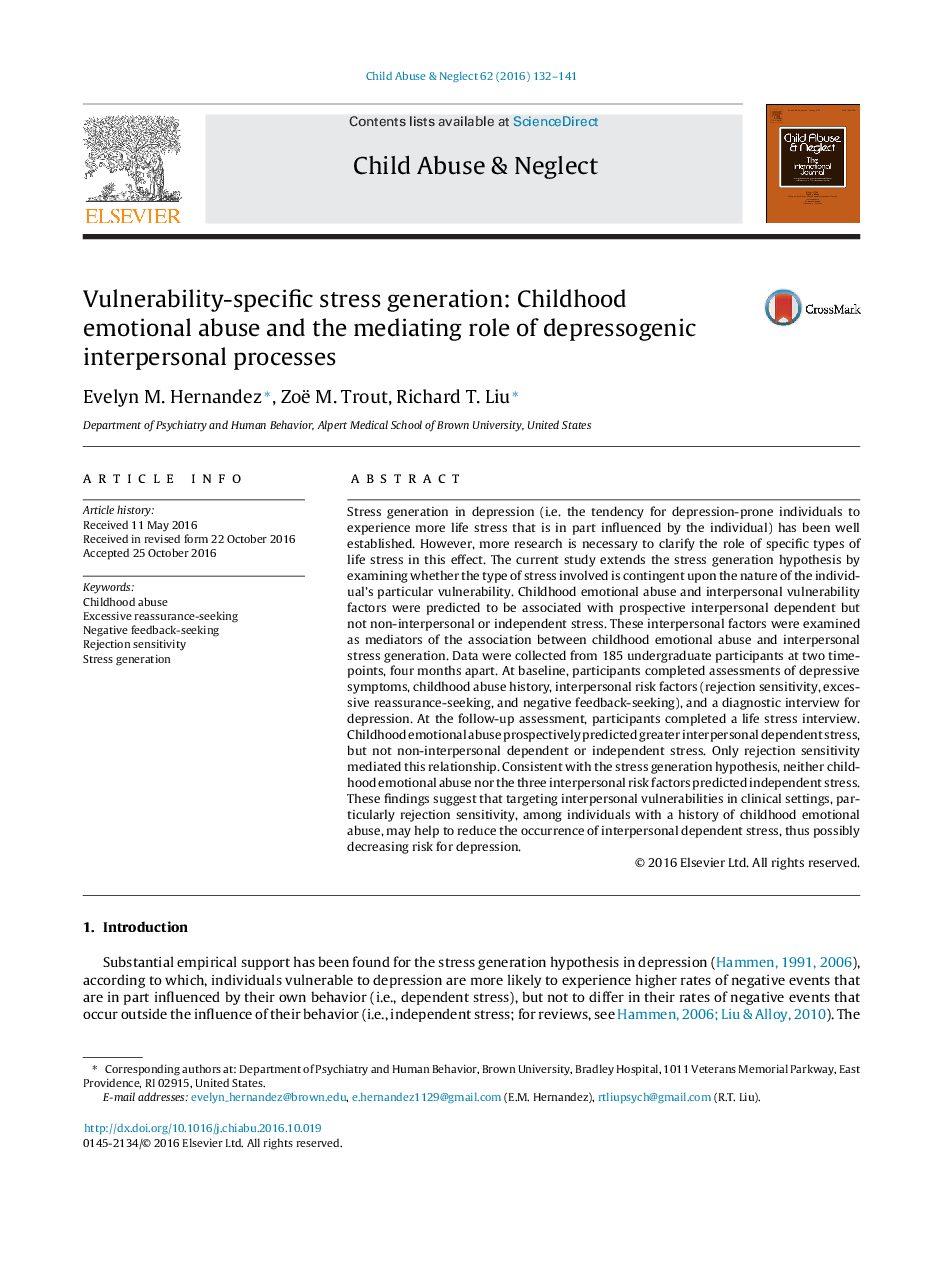| کد مقاله | کد نشریه | سال انتشار | مقاله انگلیسی | نسخه تمام متن |
|---|---|---|---|---|
| 4936160 | 1434366 | 2016 | 10 صفحه PDF | دانلود رایگان |
عنوان انگلیسی مقاله ISI
Vulnerability-specific stress generation: Childhood emotional abuse and the mediating role of depressogenic interpersonal processes
ترجمه فارسی عنوان
نسبی استرس آسیب پذیری: سوء رفتار عاطفی دوران کودکی و نقش واسطه ای از فرایندهای بین فردی افسردگی
دانلود مقاله + سفارش ترجمه
دانلود مقاله ISI انگلیسی
رایگان برای ایرانیان
کلمات کلیدی
سوء استفاده از دوران کودکی، اطمینان بیش از حد، بازخورد منفی، جستجوی، حساسیت رد، نسل استرس،
ترجمه چکیده
نسل استرس در افسردگی (به عنوان مثال، تمایل به افسردگی افراد مستعد به تجربه استرس زندگی بیشتر است که تا حدی تحت تأثیر فرد قرار دارد) به خوبی شناخته شده است. با این حال، تحقیقات بیشتری لازم است تا مشخص شود که چه نوع خاصی از استرس زندگی در این اثر وجود دارد. مطالعه حاضر، فرضیه تولید استرس را با بررسی اینکه آیا نوع استرس مربوط به ماهیت آسیب پذیری خاص فرد است، گسترش می دهد. سوء رفتار عاطفی دوران کودکی و عوامل آسیب پذیری بین فردی پیش بینی می شود که با استقرار وابسته بین فردی، اما نه در میان فردی یا مستقل، مرتبط باشد. این عوامل بین فردی به عنوان واسطه های ارتباط بین سوء رفتار عاطفی دوران کودکی و ایجاد استرس بین فردی مورد بررسی قرار گرفتند. داده ها از 185 دانشجوی کارشناسی ارشد در دو نقطه زمانی 4 ماهه جمع آوری گردید. در ابتدا، شرکت کنندگان ارزیابی علائم افسردگی، سوء استفاده از دوران کودکی، عوامل خطرزای بین فردی (حساسیت ردگیری، جستجوی اطمینان بیش از حد و جستجوی بازخورد منفی) و مصاحبه تشخیصی برای افسردگی انجام دادند. در بررسی پیگیری، شرکت کنندگان یک مصاحبه با استرس زندگی را انجام دادند. سوء رفتار عاطفی دوران کودکی به طور چشمگیری پیش بینی استرسهای وابسته به شخصیتی بیشتر، اما نه استرس غیر وابسته به شخصیتی یا مستقل. فقط حساسیت ردگیری این روابط را میطلبد. مطابق با فرضیه تولید استرس، هیچگونه سوء تفاهم عاطفی دوران کودکی و سه عامل خطر بین فردی، تنش مستقل را پیش بینی نمیکردند. این یافته ها نشان می دهد که هدف قرار دادن آسیب پذیری های بین فردی در محیط های بالینی، به ویژه حساسیت ردگیری، در افراد مبتلا به سابقه سوء رفتار عاطفی دوران کودکی، ممکن است به کاهش استرس وابستگی بین فردی کمک کند، بنابراین احتمال کاهش خطر افسردگی را کاهش می دهد.
موضوعات مرتبط
علوم پزشکی و سلامت
پزشکی و دندانپزشکی
پریناتولوژی (پزشکی مادر و جنین)، طب اطفال و بهداشت کودک
چکیده انگلیسی
Stress generation in depression (i.e. the tendency for depression-prone individuals to experience more life stress that is in part influenced by the individual) has been well established. However, more research is necessary to clarify the role of specific types of life stress in this effect. The current study extends the stress generation hypothesis by examining whether the type of stress involved is contingent upon the nature of the individual's particular vulnerability. Childhood emotional abuse and interpersonal vulnerability factors were predicted to be associated with prospective interpersonal dependent but not non-interpersonal or independent stress. These interpersonal factors were examined as mediators of the association between childhood emotional abuse and interpersonal stress generation. Data were collected from 185 undergraduate participants at two time-points, four months apart. At baseline, participants completed assessments of depressive symptoms, childhood abuse history, interpersonal risk factors (rejection sensitivity, excessive reassurance-seeking, and negative feedback-seeking), and a diagnostic interview for depression. At the follow-up assessment, participants completed a life stress interview. Childhood emotional abuse prospectively predicted greater interpersonal dependent stress, but not non-interpersonal dependent or independent stress. Only rejection sensitivity mediated this relationship. Consistent with the stress generation hypothesis, neither childhood emotional abuse nor the three interpersonal risk factors predicted independent stress. These findings suggest that targeting interpersonal vulnerabilities in clinical settings, particularly rejection sensitivity, among individuals with a history of childhood emotional abuse, may help to reduce the occurrence of interpersonal dependent stress, thus possibly decreasing risk for depression.
ناشر
Database: Elsevier - ScienceDirect (ساینس دایرکت)
Journal: Child Abuse & Neglect - Volume 62, December 2016, Pages 132-141
Journal: Child Abuse & Neglect - Volume 62, December 2016, Pages 132-141
نویسندگان
Evelyn M. Hernandez, Zoë M. Trout, Richard T. Liu,
